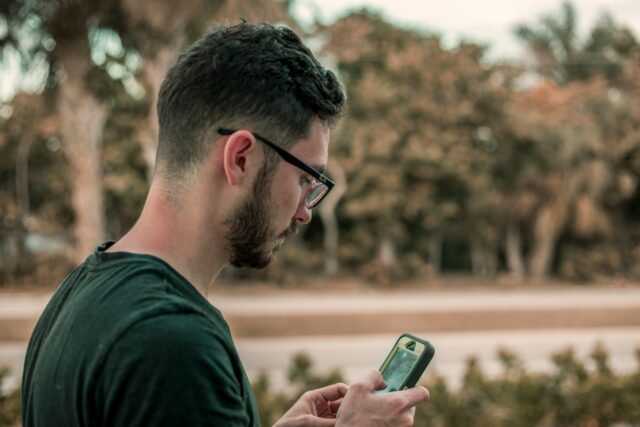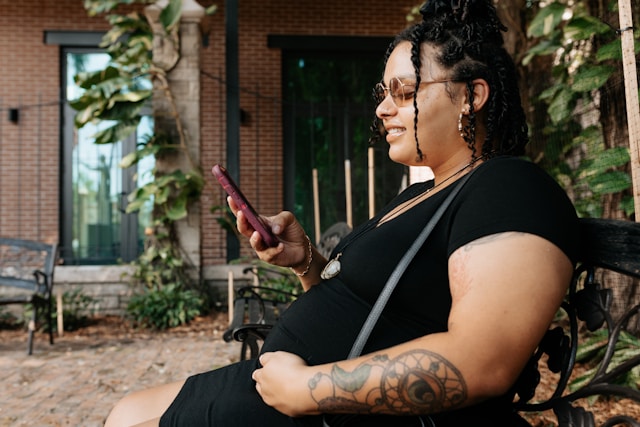Staying informed is important, but scrolling through your phone endlessly to the point that it fills you with existential dread? Not so much.

It’s a weird modern problem: you want to know what’s happening in the world without feeling like you’ve been hit by a truck afterward. Finding a balance between the two is pretty tough, especially given everything going on right now and the immediacy of information (and fake news, don’t forget!) coming your way. However, it’s important to find a way to keep up with what’s going on in the world without spiralling into a feeling of misery, hopelessness, and depression. Here’s how to do that.
1. Set specific times for checking the news.

Instead of letting updates hit you randomly all day, choose a few specific times to catch up, like once in the morning and once in the evening. It creates structure instead of chaos. Having set news-check times helps you stay informed without spiralling. It gives your brain clear start and stop points so you’re not constantly waiting for the next bit of bad news to drop.
2. Follow trusted sources, not just whatever’s trending.

Scrolling random headlines is a recipe for anxiety. Instead, pick a few trustworthy outlets you actually respect—ones that prioritise facts over fear—and check them directly when you want updates. When you’re intentional about where you get your news, you avoid the worst of the clickbait cycle that’s designed to keep you hooked on bad feelings just for the sake of ad revenue.
3. Unfollow accounts that traffic in panic.

Some accounts thrive on stirring up outrage, fear, or helplessness. If you notice a certain page or person always leaves you feeling worse, it’s okay to quietly unfollow or mute them without making a big deal out of it. Protecting your mental health doesn’t mean sticking your head in the sand. It means choosing information that empowers you, not information that’s designed to leave you feeling hopeless and frozen.
4. Read full articles instead of just headlines.
 Source: Unsplash
Source: Unsplash Headlines are often designed to provoke a reaction—they’re dramatic on purpose. Taking the time to actually read the full article usually shows you a much more nuanced, less panic-inducing picture. When you dig deeper than the headline, you stay informed instead of just triggered. Plus, you become one of the rare people who actually knows what they’re talking about, not just what’s trending.
5. Turn off push notifications for news apps.
 Source: Unsplash
Source: Unsplash Every breaking news alert feels urgent, but most of it isn’t truly time-sensitive. Turning off notifications puts you back in control of when you engage with the news, instead of letting it ambush you constantly. When you choose when to check in, rather than having bad headlines shoved at you randomly, you start to feel calmer—and weirdly, you often end up more informed, not less.
6. Limit scrolling to one or two platforms.
 Source: Unsplash
Source: Unsplash Jumping from Twitter to Instagram to TikTok to news apps creates a tornado of half-processed, often conflicting information. It’s overwhelming even before you realise you’re overwhelmed. Sticking to one or two places to check updates keeps the chaos contained. You’re still staying informed. You’re just not drowning yourself in fifteen versions of the same terrible story.
7. Use a timer when you’re checking news online.

It’s so easy to fall into the “just five more minutes” trap, and two hours later you’re deep in a comment war you never meant to join. Setting a simple timer, even for just 10–15 minutes, gives you a natural stopping point. Having a built-in end time reminds you that staying informed doesn’t mean losing your whole afternoon (or your peace of mind) to scrolling through endless bad news loops.
8. Balance every news session with something positive.

If you know you’re about to dive into the news, plan to follow it up with something good, like a funny video, a favourite song, or a quick walk outside. Treat it like a mental palate cleanser. Mixing positivity into your information diet helps you avoid that heavy, stuck feeling that can creep in after a tough news cycle. It’s not about pretending bad stuff isn’t happening. It’s about giving your brain some balance.
9. Recognise when you’re just feeding anxiety, not getting informed.

There’s a point where you’re not actually learning anything new—you’re just doomscrolling to feed that wired, anxious feeling. Recognising that moment is huge because it gives you a chance to step back. When you realise you’re chasing the emotional high of being “in the know” instead of gathering useful information, you can make a conscious choice to close the app and reclaim your sanity.
10. Create a “daily digest” habit instead of minute-by-minute updates.
 Source: Unsplash
Source: Unsplash Rather than trying to stay updated on every new development the second it happens, give yourself permission to absorb the day’s major news all at once in a calmer setting. Daily digests—through newsletters, podcasts, or even a quick news roundup—give you the highlights without the constant stress of “breaking news” bombarding you all day long.
11. Stop thinking you have to know everything immediately.
 Source: Unsplash
Source: Unsplash There’s a weird pressure to be instantly informed about everything now, but honestly, most things can wait. You don’t need to know the minute every headline drops to be a responsible, thoughtful person. Letting go of the idea that you have to be a 24/7 news sponge gives you breathing room. The world keeps turning, whether you’re checking your feed every 10 minutes or once a day.
12. Curate your social media feeds more carefully.
 Source: Unsplash
Source: Unsplash Follow accounts that balance serious news with hope, solutions, or expert analysis, not just rage and despair. Your feed is your environment, and you have way more control over it than you sometimes realise. Even a few strategic follows (and unfollows) can change the entire vibe of your daily online experience. Curating your information flow isn’t sticking your head in the sand. It’s setting yourself up to actually stay engaged long-term.
13. Talk about the news offline too.

Having real conversations with people, not just reacting online, helps you process heavy news in a healthier way. It grounds you and reminds you that you’re not alone in trying to make sense of everything. Talking it out with friends, family, or coworkers gives you perspective that doomscrolling often strips away. Plus, it turns the news from a private anxiety spiral into a shared human experience, which naturally makes it easier to carry.
14. Give yourself permission to unplug sometimes.

It’s okay (and necessary!) to take breaks. Even from important things. Giving yourself a few hours, or even a full day, away from the news doesn’t mean you don’t care. It means you understand your limits. Stepping back protects your energy so you can stay informed over the long haul without burning out. You’re not helping anyone, including yourself, by staying plugged in 24/7 if it’s slowly wrecking your mental health.




